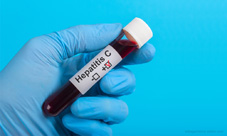16,100 tests positive on Hepatitis C in Georgia in 2018
By Gvantsa Gabekhadze
Wednesday, June 5


The report says that the government has plans to make Hepatitis C screening more available this year, which will allow infected individuals to know about the illness and receive the free of charge treatment.
1, 635, 737 people have been screened on Hepatitis C in Georgia since 2015 when the government launched the Hepatic C Elimination Programme, 132,048 have tested positive, reads the report.
The expansion of screening will concern regional hospitals.
They are likely to offer free Hepatitis C screening when an individual visits the medical institutions for primary healthcare needs.
A survey was conducted in Georgia in 2015 which revealed that about eight percent of people suffered from Hepatitis C, and a special, Hepatitis C Elimination Programme was launched with the help of the US, to help Georgian citizens get treatment.
The program aims to make Georgia a Hepatitis C-free country by 2020.
The Georgian government says that more than 125,000 people have undergone the free treatment and 98 percent have been completely cured.
For now 45 percent of the people have been screened for the Hepatitis C in Georgia, the Georgian Health Ministry reported earlier this year.
The Ministry of Health of Georgia was awarded a certificate of an exemplary country combating Hepatitis C by the European Association for the Study of the Liver and International Liver Foundation in Austria in winter 2019.
Hepatitis C is a liver disease caused by the hepatitis C virus: the virus can cause both acute and chronic hepatitis, ranging in severity from a mild illness lasting a few weeks to severe and lifelong disease, the World Health Organization says.
The hepatitis C virus is a bloodborne virus, and the most common modes of infection are through exposure to small quantities of blood. This may happen through injection drug use, unsafe injection practices, unsafe health care, and the transfusion of unscreened blood and blood products.
Globally, an estimated 71 million people have chronic hepatitis C infection.
